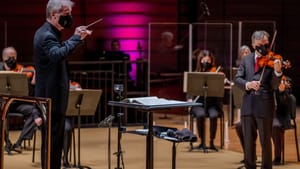Stay in the Loop
BSR publishes on a weekly schedule, with an email newsletter every Wednesday and Thursday morning. There’s no paywall, and subscribing is always free.
A secret language in music
The Philadelphia Orchestra presents a Lunar New Year Celebration Concert

The Philadelphia Orchestra welcomed the Lunar New Year and did a little time traveling with a February 4 Digital Stage production of two works by Chinese composers. The first, Chen Gang and He Zhanhao’s The Butterfly Lovers, concerto for violin and orchestra, is an older work in a newer performance. The second, Tan Dun’s Nu Shu: The Secret Songs of Women, Symphony for Microfilms, Harp, and Orchestra, is a newer work in an older performance.
Butterfly lovers
Gil Shaham, one of the stand-out violinists of our time, joined guest conductor David Robertson and the orchestra in a delightful rendition of a sweeping soundtrack retelling the legend of two star-crossed lovers who find eternal bliss as butterflies. The work was composed in 1959 when Chen and He were Shanghai Conservatory students. It wasn’t until after the end of the Cultural Revolution (around 1980) that this work and the more familiar Yellow River Piano Concerto by Yin Chengzong (based on a cantata by Xian Xinghai) gained a wider international audience.
The work makes use of the pentatonic (five-note) scale and has a bucolic feel, with some lovely writing for flute and the other woodwinds. Harpist Helen Gerhold and soloist Shaham have a charming little duet at one point.
A remarkable composition
Nu Shu is the more interesting selection. This is actually a film of a concert made in 2017 with Yannick Nézet-Séguin at the podium. It was startling to see no masks and everyone huddled close together. I was struck, too, by how staid the orchestra and its leader appeared compared to the freewheeling openness of the past 11 months. If there is anything good to come out of Covid, it’s a more relaxed and accessible performance style in classical music, which I’ve noticed in many performances streamed from Europe and the UK as well. We’ll all be glad when we don’t need the masks, but otherwise, I hope some of this freer attitude carries over into the future.
Nu Shu is really a remarkable composition, blending the arts of film and music with concerns about history and women’s culture. Like Béla Bartók, a composer he much admires, Tan Dun spent years recording folk music unique to his homeland; in Tan’s case, this was the music of the women of Jiangyong County of Hunan Province in Southern China. The women of this region not only had their own music, but developed their own language, Nüshu (“women’s writing” in Chinese), to express daily concerns and celebrations. According to the composer, they are the only women in the world to have done this. Sadly, this rich musical and linguistic tradition has died out among the women of Hunan and is kept alive only by scholars and researchers.
Tan’s suite has 13 sections with evocative titles such as “Dressing for the Wedding,” “A Road Without End,” “Forever Sisters,” and “Soul Bridge.” As the orchestra performs the score, we see full-screen images of women in various milestone moments (such as preparing for marriage) as well as country scenes appropriate to the section. A fan, upon which is painted from behind characters of the secret language, provides an opening and closing motif. Tan’s music is accessible and as contemporary as a work that debuted in 2013 can be to our ever-evolving ears. The instrumentation is for Western orchestra, but there are some percussive surprises, such as slapping hands in a bowl of water.
A secret language
Although this is a work primarily of music, I did want to know more about the Nüshu language and the context in which it developed in Hunan, where Xiang, not Mandarin or Cantonese, is the dominant language. Through outside reading, I learned that, historically, most of the rural women in Hunan were illiterate and had no protections from abusive spouses.
The development of the language gave these women an escape valve for their emotions and helped them develop a sense of community with other women in their villages. According to the Los Angeles Times, the last woman adept in this secret language died in 2004, so I am wondering who the women are in the microfilms of the orchestra performance, whether they were actually speaking Nüshu, and how the language differs from Xiang.
There is much more to know about this fascinating linguistic artifact. In future presentations of Nu Shu, it would be instructive to have additional detail about the secret language within “picture-in-picture” boxes or as an insert into the program.
But for now, many thanks to the Philadelphia Orchestra for satisfying performances of these two Chinese orchestral works. There is much new music pouring out of Chinese conservatories at this very moment. We look forward to hearing more as the orchestra offers an increasingly diverse array of first-rate music to an ever-wider audience.
Image description: A photo of members of the Philadelphia Orchestra playing with conductor David Robertson, a white man with gray hair, wearing a black face mask and a black suit and holding a baton. Violinist Gil Shaham stands playing in front of Robertson, also wearing a black suit and black face mask.
What, When, Where
Lunar New Year Celebration Concert. Chen Gang and He Zhanhao, The Butterfly Lovers, concerto for violin and orchestra; Tan Dun, Nu Shu: The Secret Songs of Women, Symphony for Microfilms, Harp, and Orchestra. Conducted by David Robertson. Gil Shaham, violin. The Philadelphia Orchestra. Livestreamed from Verizon Hall on February 4, 2020 and available to stream through February 14, 2021. Call (215) 893-1999 or visit philorch.org.
Sign up for our newsletter
All of the week's new articles, all in one place. Sign up for the free weekly BSR newsletters, and don't miss a conversation.

 Linda Holt
Linda Holt